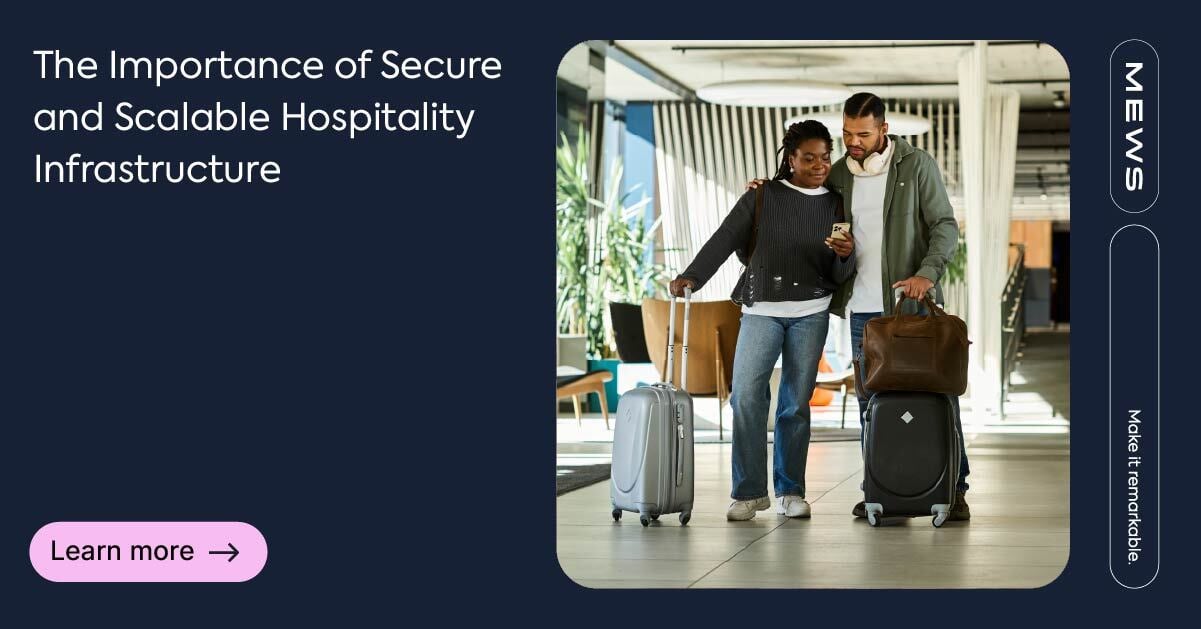
Great hospitality experiences are built on a thousand seamless micro moments from check-in to check-out and every interaction in between. When it all works, it feels effortless. But behind that effortlessness is a well–built hospitality infrastructure: fast, stable, secure – and at its best, invisible.
In episode 34 of Matt Talks, Matt sat down with Ryan Tomlinson, VP of Platform Enablement at Mews, to uncover what it really takes to keep a cloud-native property management system running reliably, securely and at scale – across thousands of properties worldwide.
The importance of hotel infrastructure
Cohesive hotel tech infrastructure is what makes a smooth guest journey possible – from taking bookings to check-ins s to handling payments securely. Let’s explore what modern hotel infrastructure looks like, why it matters, and how Mews is helping hotels stay resilient, secure and ready for scale.
Achieving 99% uptime
Any hotelier will know that downtime isn’t just inconvenient – it’s downright disruptive. It can throw an entire day (or week) off course. And in 2025, it simply shouldn’t happen.
At Mews, reliability isn’t a goal, but a mindset. Ryan explains how the team runs regular “incident drills” to proactively stress-test how the platform would respond to potential scenarios. It’s all about defensive thinking – playing out every “what if” before it becomes a “what have we done?”.
This resilience is built on Microsoft Azure’s multi-availability zones. If one data center goes down, traffic automatically reroutes to another. And thanks to built-in support for live migrations, major changes can happen under the hood without anyone noticing. In fact, last year Mews moved its hosting to a different country – with zero downtime – which is a true testament to the standards the team upholds.
Security that stays one step ahead
Hotel security is no longer a checkbox. One of the most common threats in hospitality today is phishing: attackers tricking employees into handing over login credentials.
Mews tackles this from multiple angles. One is a bug bounty program via HackerOne – paying ethical hackers to find vulnerabilities before unethical ones can exploit them.
Arguably the biggest leap forward has been Passkeys: a secure, passwordless login method using biometrics or PIN. No password = nothing to phish. Alongside Single Sign-On (SSO), which allows centralized login and access control, these innovations drastically reduce the risk of credential-based attacks. In fact, Ryan shared that SSO has meant zero successful phishing attempts at Mews.
For hotel teams – especially in high-turnover environments – both methods offer simple setup, one login, and instant user removal from a central system. See 10 ways to protect your hotel from phishing attacks.
Cloud-native and scalability
Some hoteliers still associate on-premises servers with safety – reassured by having something physical they can see. But that perception comes at the cost of reliability and scalability.
If something goes wrong – and at some point, it will – someone has to be there in person to fix it. With cloud-native infrastructure, you’re not relying on a single machine in a single room. You’re tapping into a global network of servers with built-in redundancy and auto-scaling. If demand spikes, capacity scales instantly.
Mews also invests heavily in modernizing its infrastructure. This is what enables the team to deploy new features and improvements twice daily, accelerating innovation without compromising stability.
Built for enterprise – and everyone
Mews supports everyone from independent boutiques to international chains – but the standards stay the same. Every hotel runs on the same platform, and meets the same high bar for reliability, security and performance.
For enterprise customers, features like role-based access control, SSO and Passkey authentication aren’t nice-to-haves – they’re essential. At Mews, they’re table stakes.
Just as important is transparency. Mews offers open platform documentation – from the languages and databases it uses, to how its systems scale, to the engineering practices behind it.The Mews tech blog goes even deeper, offering real-world insights into how the platform is built and maintained.
Conclusion
When choosing your hospitality tech partner, look beneath the surface. It’s no good having something that looks great on the outside if it can’t withstand the pressure underneath.
With over 300 engineers working to ensure your systems are not only running seamlessly now, but are built to scale into the future, you can feel confident you’re in safe hands.
Watch the full Matt Talks episode to hear more from Ryan – including what lies ahead on the Platform Enablement roadmap to 2027:





